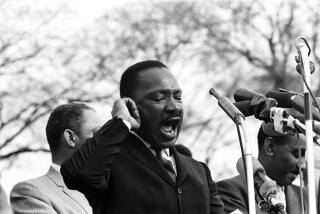Opinion: Fifty-seven years after the March on Washington, Black people are still protesting
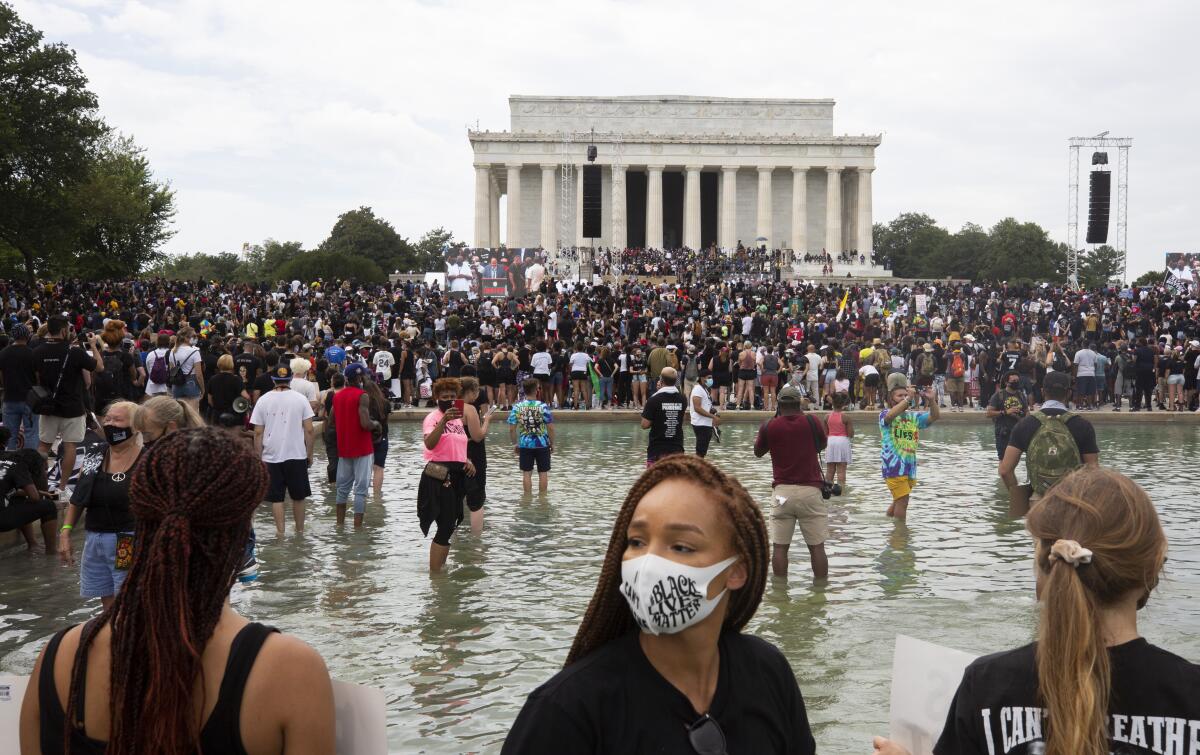
- Share via
WASHINGTON — On Friday, thousands marched on Washington in protest of systemic racism. At an event dubbed the “Get Your Knee Off Our Necks” march, ministers, activists and relatives of those killed stood at the lectern, delivering fiery and sometimes teary speeches, imploring America to divorce itself from systems that have for 244 years oppressed its Black population.
If the episode sounds familiar, that’s because it already happened. Fifty-seven years ago, thousands marched in demand of jobs and freedom and the abolition of white supremacy.
Logic says the advocacy of that moment and the legislation it spurred should have led to a permanent, radical change. And through the work of Black leaders like voting rights activist Fannie Lou Hamer and Black Panther Party co-founder Bobby Seale, America moved in the right direction.
But it did not go far enough.
This speaks to the illogical, stubborn nature of white supremacy and the challenges faced by those trying to eliminate it.
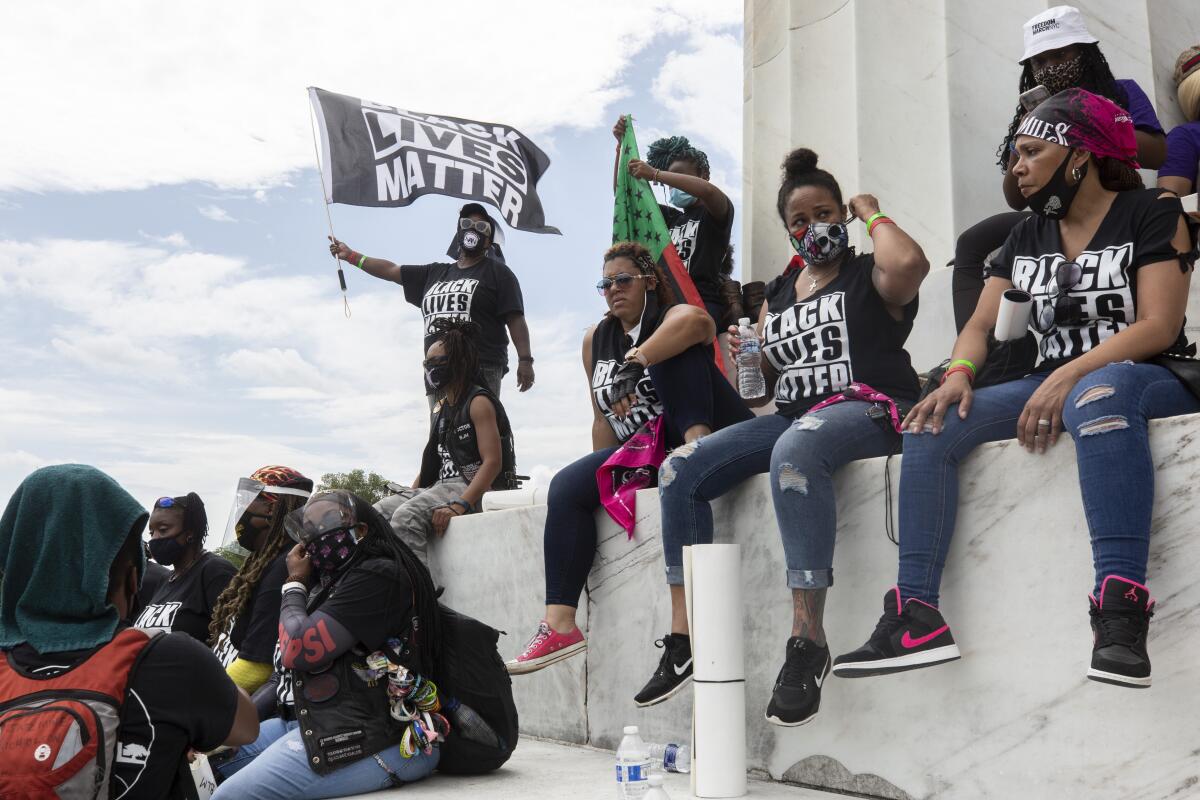
There are signs the tide is turning, to some extent.
Last year, the Democrat-controlled House of Representatives passed a bill to restore aspects of the Voting Rights Act that were gutted by the Supreme Court in 2013. And this year, the House passed legislation that bans local law enforcement from using no-knock warrants and chokeholds. But these much-needed reforms are unlikely to pass the Republican-controlled Senate. And even if, by a miracle, they become law, they will reform only a certain aspect of racism in American society.
The march on Friday was announced earlier this summer by the Rev. Al Sharpton during the funeral of George Floyd, whose killing caused Black Lives Matter to re-emerge in the news cycle and people to take a closer look at racism in American society. Although the media and the public’s attention shifted, it snapped back last week when, to no surprise, law enforcement in yet another city injured a Black man. This time it was a policeman in Kenosha, Wis., who shot 29-year-old Jacob Blake seven times in the back, in front of his three children.
During the march, Black lawmakers were bountiful. One was Rep. Ayanna Pressley (D-Mass.), who spoke of the “sacrifice and self-determination” of our Black ancestors that “shaped history and brought us to this moment.”
“We are the manifestation of the movement. We are a symbol of social, political and cultural progress,” she said.
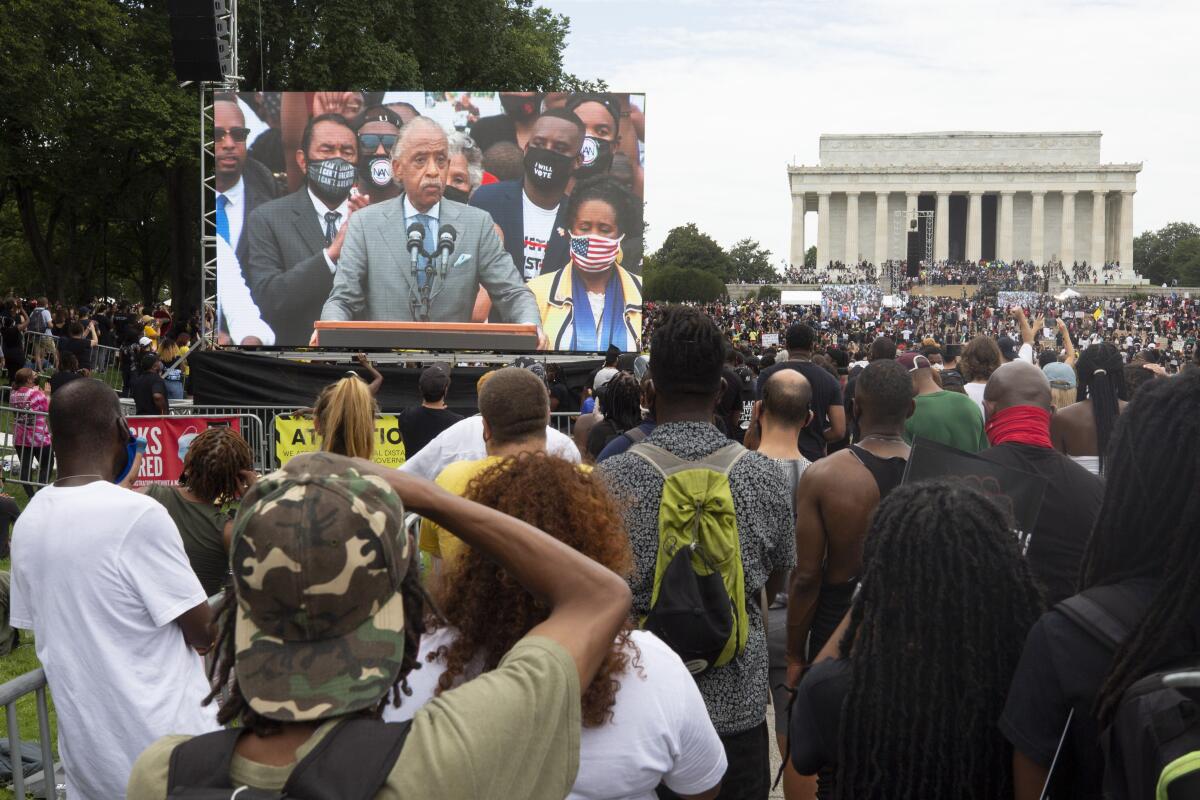
We are certainly the manifestation of a movement. The advocacy of civil rights leaders led to an expansion of the Black middle class. But we are still being killed by the police, and disparities in nearly every aspect of life remain.
This leaves me wondering how much of an impact marches on our nation’s capital can actually have.
I reached out to Johnetta Elzie, co-founder of Campaign Zero and a 31-year-old protester perhaps best known for her meticulous documentation of the 2014 Ferguson protests on Twitter. Elzie did not attend the Friday march.
“At this point, I think it’s far more important we stay in Kenosha instead of bringing people to Washington to honor traditional marches,” Elzie said. “A march in our nation’s capital will not take away the militarized police and armed militia that our friends face right now in Kenosha. We’re far beyond marching. We need to organize, activate and create change.”
I certainly agree with her. It seems as if we are far beyond organized marches and need something more revolutionary. The world does not seem poised for radical change.
On Thursday near the steps of the Lincoln Memorial, I spoke with the Rev. Nathaniel Martin, the 72-year old vice president of the Los Angeles chapter of the National Action Network, a civil rights organization Sharpton founded in 1991.
Martin said that during the Black Power movement of the 1960s and 1970s, he and his friends thought they were going to end racism.
“But racism is far more deeply rooted in the fabric, culture and institutions of the United States than we realized,” he said.
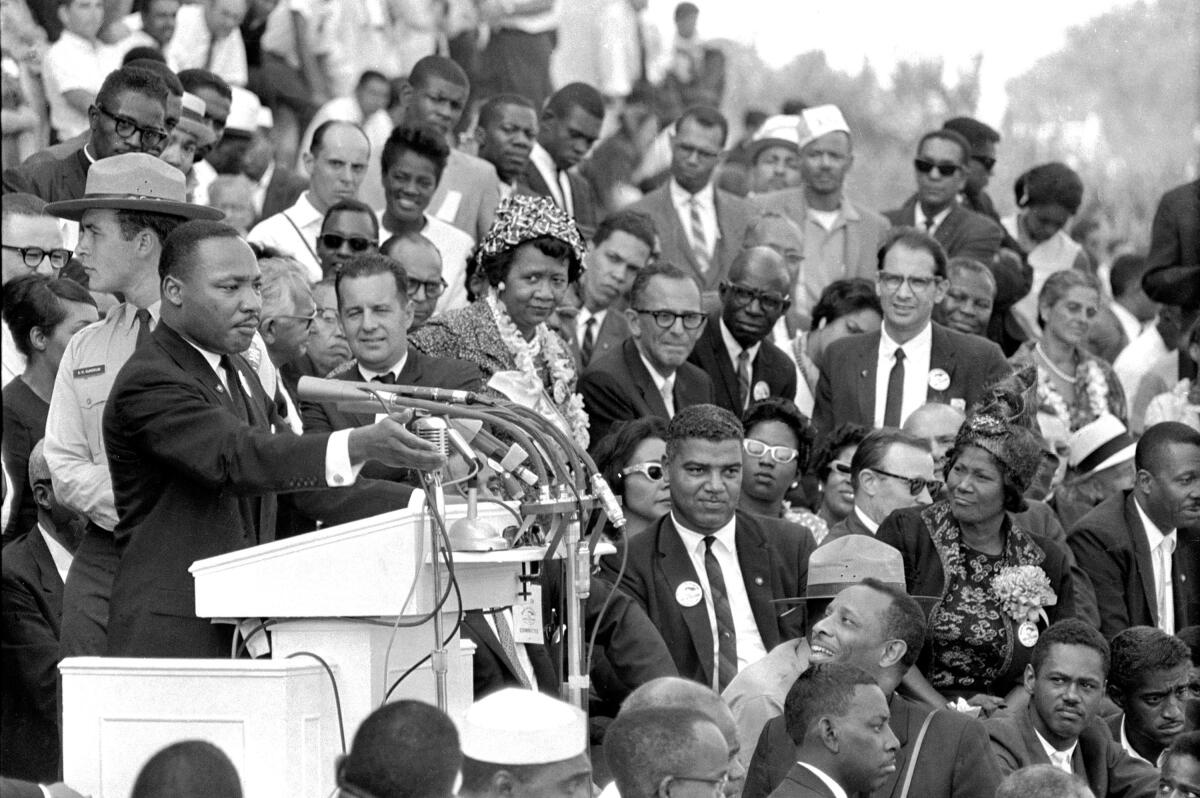
Martin has 47 years on me. He has lived through the Jim Crow South, the FBI-lead effort to destroy Black leaders and organizations and the assassinations of Malcolm X and Dr. Martin Luther King Jr. Though his humor lifted my mood, his tired spirit left me sad about the prospect of my generation’s future.
The night after we talked, I lay awake thinking about something else he said. We spoke of the inability of white Americans to see how their privilege harms people of color and discussed whether anything could be done to get rid of it.
“If you’re enjoying all the privileges, ain’t nothing wrong,” Martin said. “I don’t see white people giving up that privilege. Do you?”
Honestly, no. And that makes me sad.
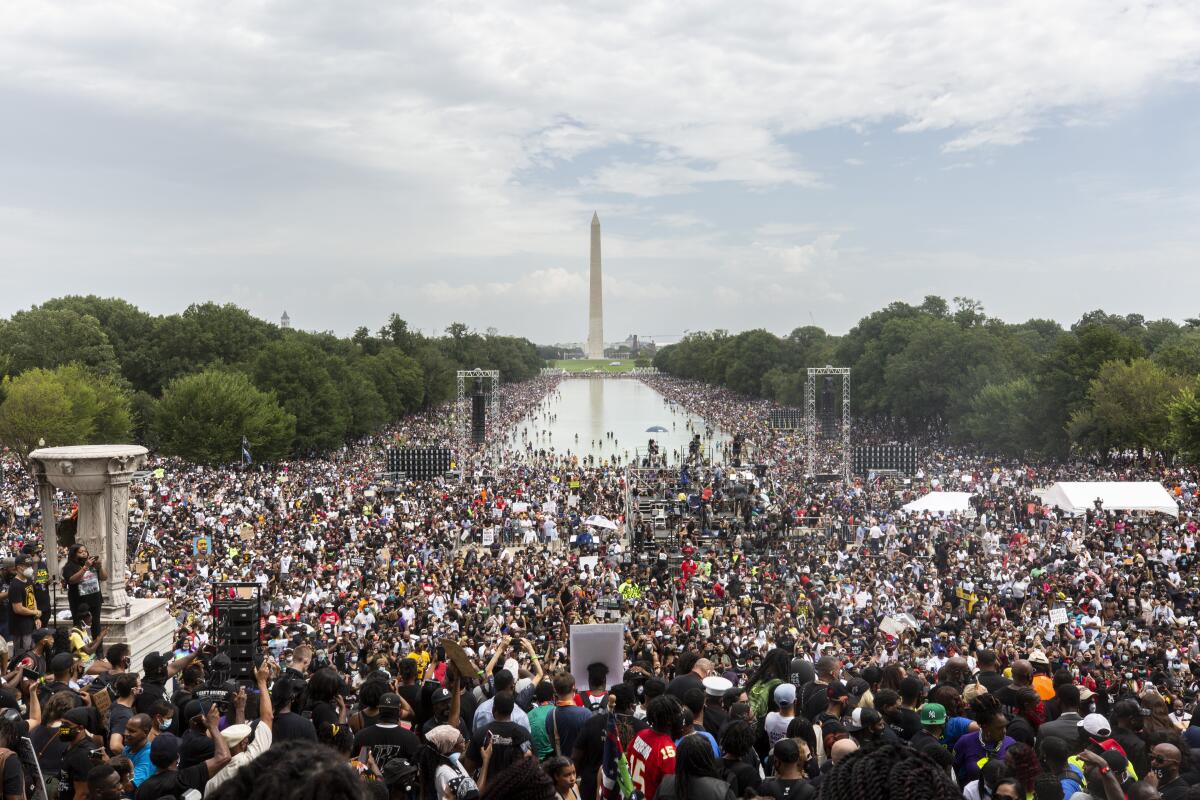
On one hand, I can confidently say that white people are becoming more sympathetic. Photographers capture them in overwhelming numbers at sporadic protests in cities like Los Angeles, Portland, Ore., and Washington. But I am unsure if they are aware that equality for all will feel like oppression for some white people.
What it means for white people to systemically give up privilege is, in part, to redistribute wealth and close the wide gap between white and Black households. To eliminate red-lining and integrate neighborhoods, to provide high-quality affordable education and affordable housing for all.
Though there is an appetite for reform from one side of the political spectrum, I fear it will not be meaningful enough. And we may very well find ourselves in 57 years marching on Washington for the radical notion that we deserve freedom and equality.
When I listened to the end of Pressley’s speech Friday, I was more hopeful.
“Another world is possible,” Pressley said. “Yes, it is possible to legislate justice and accountability.... If it feels unfamiliar, that’s because it has never been done in America.”
Perhaps that is why I cannot imagine a non-racist America. Because it has never existed. But one of the things America is known for is ingenuity. Though this characteristic has been utilized in the past in the name of oppression, perhaps it can be used to make the world a better place.
More to Read
A cure for the common opinion
Get thought-provoking perspectives with our weekly newsletter.
You may occasionally receive promotional content from the Los Angeles Times.


